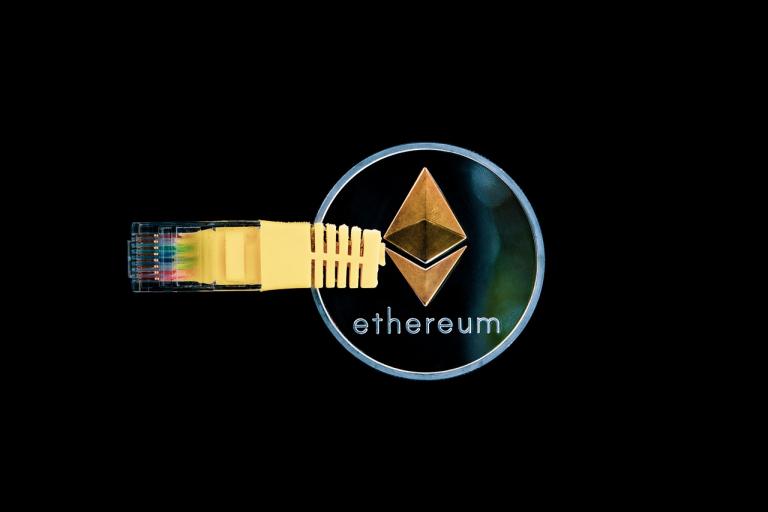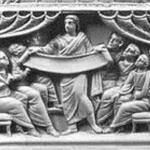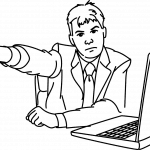Religion has its beliefs, but it also has a social dimension, with governance, organization, finance, and member involvement. A new religion has been proposed, called 0xΩ (not sure how to pronounce that), with uses technology to allow a crowd to work out their practices and their beliefs, all of which can be instantly updatable. If there ever comes a time when consensus is impossible, the technology will split up the group so that each can go in its own way.
This is the brainchild of Matt Liston, who is an atheist, but who takes this very seriously. The religion will be built around blockchain technology, a “decentralized ledger system” originally designed for the cryptocurrency Bitcoin. The technology is at the heart of another, arguably more sophisticated, cryptocurrency called ethereum.
Liston was ousted from the online venture Augur, “a decentralized oracle and prediction market platform.” (For a helpful discussion of what this means, go here. For the $152 million lawsuit he has launched, go here.) Liston has since launched a similar startup named, significantly, Gnosis. (Here is a good article on Gnosis, cryptocurrencies, and Liston’s investment schemes.)
Anyway, here is what Mr. Liston thinks he can do for religion. . .
From Michael del Castillo, Blockchain Prophet Or Snake-Oil Salesman? Embattled Founder Launches First Ethereum Religion,in Forbes:
“It’s a religious framework that could allow for belief sets to update much more quickly and also to democratize the relationship between membership and convergence on what everyone believes in this religion,” said Liston, who is also a founding member of ethereum startup Gnosis. . . .
The first step of the religion governance model is reminiscent of how stockholders might update by-laws via a proxy vote. Specifically, the model allows for believers to identify, approve and evolve their own sacred texts via a smart contract, blockchain-enabled code that gives users the assurance they’re all viewing the same data without a middleman to verify the content. In the case of 0xΩ, those texts will likely be largely composed of Liston’s own flame paper—a play on the term “white paper,” usually used to describe a startup’s services prior to having any functioning code. But that too could change based on the preferences of those involved.
“The idea is you can take an existing religion, say Judaism, and you could place the scripture in a blockchain,” said Liston.
From there, the governance model further resembles proxy-voting in that it gives adherents of a religion the ability to appoint leaders and fund projects that fulfill the religion’s mission. In an evolution of the traditional patronage model, the governance structure is further being designed to let the faithful fund religious artwork and commission the construction of churches, synagogues, and mosques without the need of middlemen. . . .
“In this religion, the people participating and involved could essentially vote and continuously change the structure and nature of it,” says Singer, who variously describes Liston as a Cryptsiah, and a Cryptophet, titles that he refuses. If consensus can’t be achieved, however, Liston plans to use another blockchain concept, called a hard fork, where the historical transactions of the open-source distributed ledger are copied and used by a new group that follows a modified governance model.
Everybody comes to a consensus about what they are going to believe! And whatever that is can be updated and continuously changed by a simple vote! That way, the religion can’t be bogged down by traditions or unchangeable dogmas! You could put the Scriptures in the blockchain and let people vote on what parts they want to keep! And since everybody votes and since blockchain lets decisions be decentralized, there are no authorities or teachers that you have to obey! Thus, the perfect religion! Or, religions, since if there is a lack of consensus, the “hard fork” kicks in, and the software will make possible a new breakaway religion!
There is no provision, of course, for whether or not a religious belief might be true. And the software doesn’t factor in the possibility of an actual God, who might reveal Himself and who might have His own agenda, other than what the crowd votes for.
What you have here with 0xΩ is what an atheist thinks religion is. Nothing but institution, all man-made, and void of transcendence.
But zero times Omega is zero.
Illustration, with the Ethereum cryptocurrency logo by WorldSpectrum via Pixabay, CC0, Creative Commons













